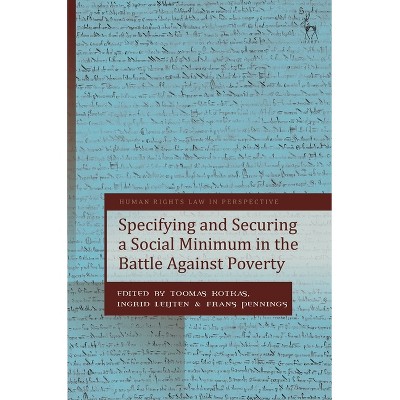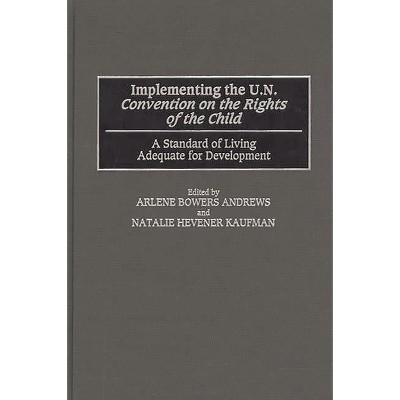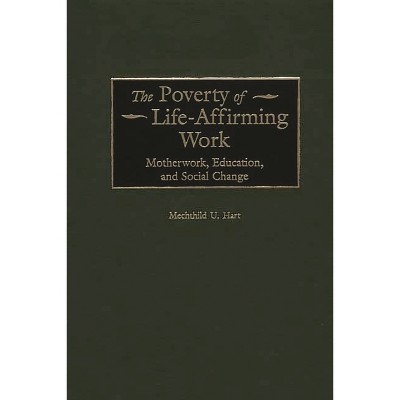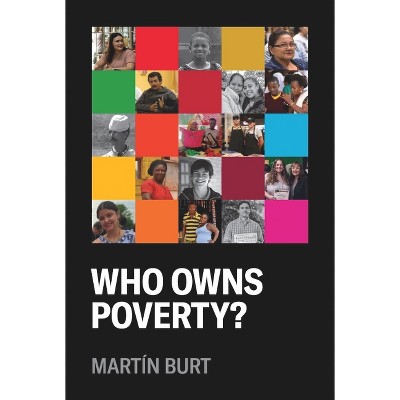Sponsored

Human Rights and Choice in Poverty - by Alan G Smith (Hardcover)
In Stock
Sponsored
About this item
Highlights
- This interdisciplinary study applies human rights theory to the problems of rural poverty in the Third World.
- About the Author: ALAN G. SMITH is Associate Professor of Political Science at Central Connecticut State University.
- 192 Pages
- Political Science, Public Policy
Description
About the Book
This interdisciplinary study applies human rights theory to the problems of rural poverty in the Third World. Considering the interdependence of minimal food and health security with minimal assurance of basic freedoms, political scientist Alan G. Smith traces the linkage to the need of the food-insecure to seek clientelistic dependencies on better-off neighbors--relationships that often operate to restrict freedom of choice. In contrast to conventional rural development aid, which can introduce new client dependency if pursued alone, Smith stresses the need to find other forms of aid that would provide the option of assured minimal survival while avoiding the constraints imposed by dependency. Arguing for bolstering bottom-up human rights momentum, he suggests the transfer of appropriate tools into the hands of the target group. Recipients would make use of them to enhance autonomous food-crop production, thereby making client dependency a matter of choice rather than necessity.
Smith illustrates the Third World predicament of food insecurity leading to infringement of rights by drawing together empirical evidence from Bangladesh, Botswana, and Tanzania. He further argues that respect for human rights involves a duty on the part of advantaged nations to address the Third World predicament with practical measures fully consistent with human rights, and for each of these three country cases, Smith recommends direct locally specific minimalist aid. His model, its practical illustration, and recommendations should be valuable to academics and students in the fields of rural sociology, anthropology, and political science--especially those focusing on human rights, poverty, and Third World development--as well as bureaucrats and consultants in the development aid field.
Book Synopsis
This interdisciplinary study applies human rights theory to the problems of rural poverty in the Third World. Considering the interdependence of minimal food and health security with minimal assurance of basic freedoms, political scientist Alan G. Smith traces the linkage to the need of the food-insecure to seek clientelistic dependencies on better-off neighbors--relationships that often operate to restrict freedom of choice. In contrast to conventional rural development aid, which can introduce new client dependency if pursued alone, Smith stresses the need to find other forms of aid that would provide the option of assured minimal survival while avoiding the constraints imposed by dependency. Arguing for bolstering bottom-up human rights momentum, he suggests the transfer of appropriate tools into the hands of the target group. Recipients would make use of them to enhance autonomous food-crop production, thereby making client dependency a matter of choice rather than necessity.
Smith illustrates the Third World predicament of food insecurity leading to infringement of rights by drawing together empirical evidence from Bangladesh, Botswana, and Tanzania. He further argues that respect for human rights involves a duty on the part of advantaged nations to address the Third World predicament with practical measures fully consistent with human rights, and for each of these three country cases, Smith recommends direct locally specific minimalist aid. His model, its practical illustration, and recommendations should be valuable to academics and students in the fields of rural sociology, anthropology, and political science--especially those focusing on human rights, poverty, and Third World development--as well as bureaucrats and consultants in the development aid field.Review Quotes
?Smith has combined theory from the social sciences and philosophy to develop a theoretical model for development that identifies the civil-political dimensions of socioeconomic relationships. He argues that the continuing low level of effectiveness of development aid is the result of ongoing dependency of the rural poor on short-term security measures.... This model takes the basic needs approach and places it within the context of civil-political rights. Of great interest to development professionals and social scientists involved in the study of directed social change.?-Choice
"Smith has combined theory from the social sciences and philosophy to develop a theoretical model for development that identifies the civil-political dimensions of socioeconomic relationships. He argues that the continuing low level of effectiveness of development aid is the result of ongoing dependency of the rural poor on short-term security measures.... This model takes the basic needs approach and places it within the context of civil-political rights. Of great interest to development professionals and social scientists involved in the study of directed social change."-Choice
About the Author
ALAN G. SMITH is Associate Professor of Political Science at Central Connecticut State University. His publications relating to human rights and development have appeared in the Journal of Social Studies, in the yearbook Human Rights in Developing Countries, and in reports and papers of human rights institutes.Shipping details
Return details
Frequently bought together

Trending Non-Fiction
















